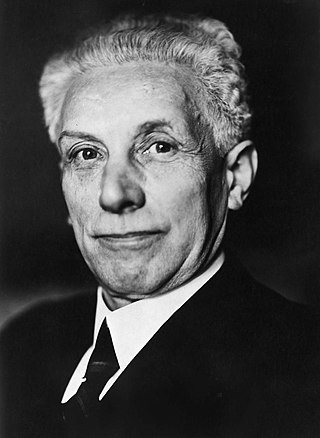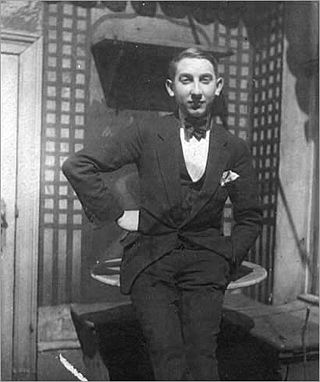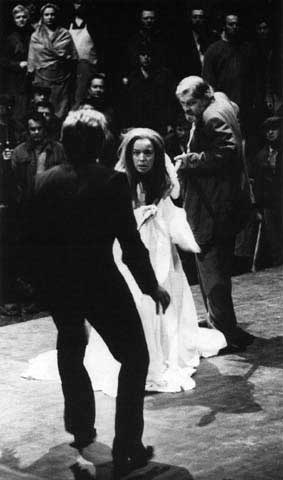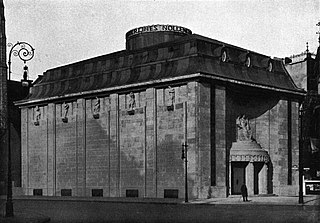
Kurt Julian Weill was a German-born American composer active from the 1920s in his native country, and in his later years in the United States. He was a leading composer for the stage who was best known for his fruitful collaborations with Bertolt Brecht. With Brecht, he developed productions such as his best-known work, The Threepenny Opera, which included the ballad "Mack the Knife". Weill held the ideal of writing music that served a socially useful purpose, Gebrauchsmusik. He also wrote several works for the concert hall and a number of works on Jewish themes. He became a United States citizen in 1943.

Emil Erich Kästner was a German writer, poet, screenwriter and satirist, known primarily for his humorous, socially astute poems and for children's books including Emil and the Detectives and The Parent Trap. He received the international Hans Christian Andersen Medal in 1960 for his autobiography Als ich ein kleiner Junge war. He was nominated for the Nobel Prize in Literature in six separate years.

Leon Jessel, or Léon Jessel, was a German composer of operettas and light classical music pieces. Today he is best known internationally as the composer of the popular jaunty march The Parade of the Tin Soldiers, also known as The Parade of the Wooden Soldiers. Jessel was a prolific composer who wrote hundreds of light orchestral pieces, piano pieces, songs, waltzes, mazurkas, marches, choruses, and other salon music. He achieved considerable acclaim with a number of his operettas — in particular Schwarzwaldmädel, which remains popular to this day.

The Hunchback of Notre Dame is a musical with music and lyrics by Alan Menken and Stephen Schwartz. Adapted from Walt Disney Animation Studios 1996 film of the same name, which in turn was based on the 1831 novel of the same name by Victor Hugo. The musical premiered in 1999 in Berlin as Der Glöckner von Notre Dame, with a book by James Lapine. It was produced by Disney Theatrical Productions, being the company's first musical to premiere outside the United States. It ran for three years, becoming one of Berlin's longest-running musicals.

Johann André was a German musician, composer and music publisher of the Classical period. He was born and died in Offenbach am Main.
Edmund Nick was a German composer, conductor, and music writer.

Mischa Spoliansky was a Russian-born composer who made his name writing cabaret and revue songs in the Weimar Republic of the 1920s and early 1930s, before he was forced to emigrate to London in 1933 when Hitler rose to power. He stayed in Britain for the rest of his life, re-inventing himself as a composer of film scores.
James Reynolds studied contemporary music under John Adams, as well as percussion at the San Francisco Conservatory of Music and composition in Cologne under Michael von Biel. Informed by many different influences – from Neue Musik, Broadway and European music theatre to avant-garde synthpop – Reynolds’ compositions explore the combination of words, sounds and images. He was Composer in Residence at the Stiftung Laurenz-Haus in Basel and Visiting Artist at the University of California, Santa Barbara. For over three decades, he has written music for literary productions, thrillers, fairytales and children’s radio plays for West German Radio (WDR/Cologne). His compositions for music theatre, dance-theatre, film and television productions are performed and broadcast for and to an international audience.

Richard Otto Bruno Kastner was a German stage and film actor, screenwriter, and film producer whose career was most prominent in the 1910s and 1920s during the silent film era. Kastner was one of the most popular leading men in German films during his career's peak in the 1920s.
Arthur Maria Rabenalt was an Austrian film director, writer, and author. He directed more than 90 films between 1934 and 1978. His 1958 film That Won't Keep a Sailor Down was entered into the 1st Moscow International Film Festival. Two years later, his 1960 film Big Request Concert was entered into the 2nd Moscow International Film Festival. His career encompassed both Nazi cinema and West German productions. He also wrote several books on the 1930s and 1940s wave of German cinema.
Peter Lund is a German theatre director, playwright, and author, as well as Professor for Acting at Berlin University of the Arts. He has pioneered the New German Musical at the Neuköllner Oper in Berlin.

The Jahrhundertring was the production of Richard Wagner's Ring cycle, Der Ring des Nibelungen, at the Bayreuth Festival in 1976, celebrating the centenary of both the festival and the first performance of the complete cycle. The festival was directed by Wolfgang Wagner and the production was created by the French team of conductor Pierre Boulez, stage director Patrice Chéreau, stage designer Richard Peduzzi, costume designer Jacques Schmidt and lighting designer André Diot. The cycle was shown first in 1976, then in the following years until 1980. It was filmed for television in 1979 and 1980. While the first performance caused "a near-riot" for its brash modernity, the staging established a standard, termed Regietheater, for later productions.

Corin Curschellas is a Swiss singer-songwriter, vocalist, free improvisation, actress, voice actress in as well as voice instructress.

Charles Lewinsky is a Swiss screenwriter and playwright, as well as a writer of novels and non-fiction, born and living in Zürich.

Angela Roy is a German actress and director.

The Ufa-Pavillon am Nollendorfplatz was a cinema located at 4 Nollendorfplatz, Schöneberg, Berlin. Built in 1912–13 and designed and decorated by leading artistic practitioners of the day, it was the German capital's first purpose-built, free-standing cinema Described as "historically, [...] the most important cinema in Berlin", it incorporated a number of technical innovations such as an opening roof and a daylight projection screen, and opened as the Nollendorf-Theater in March 1913.
Carlernst Ortwein, pseudonym Conny Odd, was a German classical pianist and composer.
George Washington Pittrich was a German composer and Kapellmeister.
Andre Asriel was an Austrian-German composer.
Joachim Werzlau was a German pianist, radio consultant and composer. He belonged to the first generation of composers in the GDR, where he was also active in organisations and politics. As a pianist, he played for the theatre, for Mary Wigman's dance school, and a kabarett, among others. He composed popular songs, music for audio plays, film scores, incidental music, and three operas. With films such as Nackt unter Wölfen and Jakob der Lügner, he was the most popular film composer of the GDR of his time.











